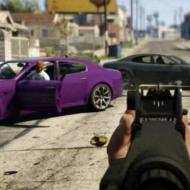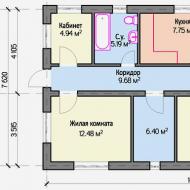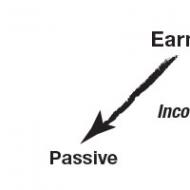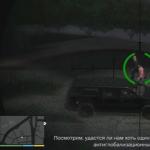
Warrior from the Legion of non-savers. The structure of the cash funds of the military unit. Financial relations arising in the process of the military unit. Financial and Economic Elements
lieutenant-General Deputy Head of the Central Financial Department of the MO CCRR Member of the Great Patriotic War, received two injuries, including one heavy. In 1 965 graduated from the military faculty at MFI. Passed the way from the primary posts of financial service to the head of the CVO financial service, the head of labor management and wages Sun of the USSR, Deputy Head of the Central Committee of the USSR MO. He was awarded the orders of the Patriotic War I degree, a labor red banner, "For the service of the Motherland in the Armed Forces of the USSR" III degree, medals.
After six-month training in the Yaroslavl courses of improving the officer of the Intensdant Service and the assignment of the military rank of the "Junior Lieutenant of the Intensdant Service", until June 1958, I held military service at military financier positions with the military title "Junior Lieutenant Major". During this period, he tried twice to enter the Higher Military Educational Institution - to the Academy of Rear and Transport and the Military Financial Faculty of Economics at the Moscow Financial Institute.
But attempts were not crowned with success due to the presence in my lung metal fragments - the result of severe injured in the war. I realized that the ways to obtain the desired senior military education for me are insurmountable and resigned to this, continuing the military service as a senior officer of the Department of Money Proliferation of the Financial Department of the North Caucasus Military District. But unexpected happened. The head of the Financial Department of the County Colonel Fyodor Filippovich Ishchenko summoned me on a conversation and began it from the party questions, which did not surprise me, because I performed the responsibilities of the secretary of the party organization for three years. Then he said that he was going to dismiss from the armed forces, without seeing for himself further official prospects, and, expressing regret that I had no supreme military education, I asked me to tell me that I had not allowed me to continue studying.
I reported in detail, and about my desires, and about failures in this matter. He said that the department received discharging for three places to pass entrance exams at the Faculty - two on the full-time compartment and one - to correspondence. Last he offered to take me. I replied that fragments remain in the same
place and the Commission will once again block the path to admission. Then Fyodor Filippovich advised me to enter the Voltopser in the 10th grade to better prepare for the exams. And I decided to experience fate. In the second half of the school year, I was even credited for permanent training in the 10th grade and, passing the state exams, I received a second certificate of maturity with good estimates. Having introduced the head of the correspondence department of the Faculty to Colonel S.A. Glamazda of arrival for passing entrance exams at the faculty, heard from him: "Very good. You are appointed elderly courses of the correspondence department. " Then he handed me lists of students arriving for receipt and passing exams, gave instructing and ordered to act. Going to the corridor, I began to view lists. The heart fluttered.
Against my last name, a fat feltster was written "refuse." Returned to the Colonel and asked with the shudder: what would it mean? He indignantly spoke in favor of the Secretary of the Department for the fact that she did not remove the crucial word. It turned out, my age was no longer suitable for receiving the faculty. And only with the permission of the head of the Central Federal District of General Polokovnik V.N. Dutova, as older in age and service life and participant in hostilities, I was admitted to entrance exams. After passing them with the estimates of "4" and "5," I was enrolled by the listener of the first year of the Military Faculty at MFI, at the correspondence department. There were five years intense training ahead.
The correspondence course of study was formed from decent, who widthly know the area of \u200b\u200bmilitary finance and economics. The faculty faculty of the faculty put great efforts to grafiate students professional knowledge, as well as to enhance the cultural level.
It should be recognized that some listeners are not in all subjects of learning there were high knowledge for the reason that they poorly learned them. I will give one example. Senior Lieutenant Nikolai Taran Professional financial disciplines knew adequately, but the German language was given to him with difficulty. In the near future, state exams were in the near future, and the knowledge of this subject was not given to him. He handed over the exam three times and everything was unsuccessful. I had to cut off a friend not in a standard way.
I asked Nicholas a test book, I found a teacher at the Institute german language And with difficulty, it simplified it to take sin on the soul - to put the taran in the test book "3". She was outraged for a long time, but still put Taran to the taper.
I went to this deed, because I rightly considered that in the near future, after the end of the faculty, the deep knowledge of German Nikolai would not need.
Other training trips happened, but they did not affect negatively to study the listeners. As you know, the learning subject "Philosophy" requires deep thinking, especially when writing test control topics.
My friend Nikolai Ryazaev understood it when they wrote one of the test work. Leware from Rostov-on-Don on a business trip, I packed with myself a decent bunch of various literature on philosophy, as well as the work of prep-governors and students.
A month later, I called home and my wife read me a review: "Tov. Tishin! You took the work of the professor ..., conscientiously rewrote it and therefore the work was not credited. " After returning home in a week, I wrote a new job, which was reported. This happened to Nikolai Ryazhen. Having arrived at the institute on the exam session, I saw the teacher of Colonel A.S. Izikovich, who told me: "Tov. Tishin! How did you manage to rewrite the lecture of the professor ... and submit it as personal testing? ". I replied: "Tov. Colonel! I give the floor of the officer that the lecture of the professor mentioned by you I did not see and even heard anything about him. When writing test work, I enjoyed brochure, vocabulary on philosophy and partly by the work of a student of the Economic Department of the Rostov Financial Institute. I could never think that Professor was a student plagiarifier and the author of the brochure. "
My Nikolai and I have identified the following tactics of the state examination in philosophy. They scored a lot of questions, went to Hayzikovich for consultation and brought a decent dispute with him. On the exams, and Nikolai and I went together. Taking tickets, got to write answers for each other. Izikovich approached me, I took an examination ticket, a draft sketch of answers on him, a test book, and said: "You can be free," and after some time I took a trick and handed it to me. Opening it, I saw the rating "5". He also came with Nikolai. So we are shared with the credit on philosophy.
Training of listeners in the field has played a big role in mastering the combat skills.
With advantage, high responsibility and professionalism graduates of the Faculty, including those who graduated in the nearby past, participated in the elimination of the accident at the Chernobyl NPP, in hostilities in Afghanistan, in Czechoslovak and other combat events. I also had to fulfill complex and responsible tasks of the command leadership of the Ministry of Defense.
On September 20, the Military Financial and Economic University would be 70 years old. Unfortunately, it is no longer. He fell under merciless reforms, covered armed forces in the 2000s. But the experience of training military financiers was accumulated unique. He did not lose imports today, as, however, are relevant and full of bright pages of birth and life of this educational institution.
After the Great Patriotic War, the task of preparing financial and economic personnel for the armed forces, especially the guideline. At the proposal of the head of the Finnishing Department of the Military Office, General Yakov Khanyenko, with the support of the leadership of the Ministry of Finance on September 20, 1947, Deputy Minister of the USSR Marshal of the Soviet Union Alexander Vasilevsky and Minister of Higher Education Sergey Kaftanov signed a joint order for the organization of the Military Faculty at the Moscow Financial Institute.
Pioneer
In July 1948, the head of the faculty was appointed an experienced Financier General Major Sergey Spiridonov. The participant of the Civil and Great Patriotic War, he became the first of the Pleiads of Frontovikov's leaders who have invested military experience in organizing the educational process.
The staff of the faculty entered the management, four courses of listeners, three departments and service units. In 1949, commissioned courses of improving officer composition, and in the 1950s - a special department for the preparation of military personnel of foreign armies and adjuncture. By 1960, a slender system of training of military financiers was formed.
In the period from 1955 to 1963, scientists departed a number of monographs, released six collections of scientific notes. In these works, there were reflected questions of the theory and practice of finance of the USSR SCSR, cash security troops. B. Rivkin, N. Verba, B. Kein, N. Gritsynin, I. Lakhmetkin, V. Pyusenik, B. Savchenko, V. Shcherbak, Yu. Chernov, V. Schcherbak, Yu. Chernov, V. Tivanov, contributed to the development of science on finance of the Armed Forces. Korolev and others.
In January 1963, at the Department of Finance, two research laboratories were formed - "automation" and "financial service problems". Their activities contributed to strengthening the regime of savings in the use of public funds in the army and on the fleet, improving the quality of the fink distance, the fight against loss material values and money.
A characteristic feature of the development of the faculty in 1963-1972 was the increase in the level of military-economic training of listeners. New disciplines have been introduced, developed courses on the study of the economy, organization and planning of industrial production and caption in the USSR MO, analysis economic activity enterprises and construction organizations.

In 1967, the faculty began to prepare the officers of the leadership in the system of field agencies of the State Bank of the USSR to ensure the financing of new types of armed forces, primarily RVSH.
The professorical and teaching staff took an active part in preparing for the introduction of the annual system from January 1, 1970 financial planning, as well as the use of impersonal financing that has allowed commander to send funds to the decision of the priority tasks. This step, supported by the Ministry of Finance, was revolutionary for that time. It is noteworthy that in the public sector of the country to such financing only in the twentieth century.
The logical completion of the restructuring of the educational process with a bias on the economy was the creation of an independent department of military-economic disciplines in 1971, the first head of which was Colonel A. Grishin.
The confrontation and rivalry between the NATO block and the Warsaw contract was accompanied by the development, production and adoption of increasingly complex complexes and systems. This resulted in strengthening the bonds of the Economy of the Armed Forces with the Defense and Industrial Complex, the growth of military expenses. To optimize them, it was decided to improve the qualifications of the management team of military missions (VP): the department of the economy and the organization of the production of defense industries was created, the head of the Colonel-Engineer V. Zhikharev is appointed. The country's leading specialists, scientists, practitioners, financiers, economists were selected. From October 1974, the Department began training officers, and in the future and ordered offices, NIOs, industrial enterprises and organizations of the Ministry of Defense.
In 1976, specialists with higher military education were already preparing at the faculty. Graduates got the opportunity to study economic analysis Theaters of hostilities, the choice of rational options for ensuring the needs of troops. The main efforts were directed to the practical side of the training and the achievement of the logical connection between educational processes Yaroslavl Higher Military Financial School named after General A. V. Khrulev and the Military Faculty, the creation of a slender system for training specialists of the Finservitus with the highest military education.
Military special training has become provided by two groups of disciplines: financial and economic, the number of which has increased significantly. In 1979, the first edition of officers with higher military education was held, which were almost completely directed to the central bodies of the aircraft. And from the 1981st, higher military education began to receive graduates of the branch of absentee training.
The arrival in the troops of such specialists was accompanied by the expansion of the rights of managers of loans of all degrees to use budget funds. In the army and on the fleet began to be implemented standards of expenses, the remains were allowed to use next year. This led to a significant budget economy of the Ministry of Defense.
Financial Guardian
When creating the Armed Forces new Russia And the reduction in their numbers appeared proposals for the preparation of military financiers in civil universities, although such attempts rejected life itself in the 20s of the last century. They tended, as a rule, from some reformers, which, apparently, it was not clear that the armed forces are a specific state body designed to ensure the security of the country. And the military faculty always prepared frames for the organization financial support The troops and forces of the fleet not only in the conditions of their real dislocation, but also applications, and if necessary and personal participation in hostilities, where the use of civilian specialists is in fact impossible.

In the era of "privatization", and simply - the population of state, including the Army Property, the Military Financial and Economic Faculty turned out to be a lounge piece for some representatives of the new Russian elite, which were alien to the training of specialists of such a profile, they were interested in personal mercenary goals. From attempting by property under the guise of various controversial reorganizations, the employees of the Military Faculty were repelled repeatedly.
When reforming the military education system in accordance with the Decree of the President of the Russian Federation of October 13, 1998, a military financial and economic university was established as part of the Military Financial and Economic Faculty and Yaroslavl Supreme Military Financial School on the Rights of the Branch. This decision was to create a multi-level educational and scientific complex, to form a single systematic approach to the training of personnel of the financial and economic service. Such an association marked the beginning of one of the most productive periods of activity. In the short period there were serious changes in the educational process. New technologies have been introduced, quality has increased scientific workThe qualifications and potential of the teaching staff have grown, which has positively affected the professional graduate level.
One of the mains remained the Department of Finance and Management banking activities In the sun. Her representatives were attracted to conducting classes even in other universities. At the Academy of General Staff, lectures on the problems of the defense budget were read annually. Textbooks and monographs were prepared here, dozens of benefits, more than 70 dissertations were protected, various NIR and operational tasks were carried out.
Back in 1977, the Department of Financial and Economic Activities and Control (Organization of Financial Services and Control) was issued from the Department of the Russian Federation to strengthen the practical orientation of listeners (organizing financial services and controls), the first head of which was appointed Colonel Y. Chernov. On it they taught the disciplines of an applied nature - they prepared listeners to work by the heads of the financial service of the compounds and structural units District and Army link. Under the guidance of the Financial Inspectorate of the CFC of the Russian Federation, the first textbook on financial control was prepared here.
The department of economic management and accounting and analytical activities in the Armed Forces of the Russian Federation (the economy of the Armed Forces) appeared in its kind, which, being relatively young, under the leadership of the First Chief of the Doctor of Technical Sciences, Professor G. Zhukov, brightly announced itself. The country's first military-economic analysis textbook was published here, which immediately began to enjoy high demand in both universities and research institutions of the Ministry of Defense. Disciplines appeared for the first time: Military-economic analysis, military financial informatics. From the 2000th, by decision of the Minister of Defense, EC engineers with higher military education are prepared here. Her graduates of 2002-2006 had a significant impact on the development of the industry and the current state of the state defense order management system. To date, the textbook "Prices and pricing" published by the Department in 1985 is the only one in the country.
In the development of scientific foundations military economy Many work was invested by university scientists: R. Pharmal, A. Fius, N. Abrosimov, S. Ermakov, V. Zhikharev, Zhukov, S. Viculov, etc.
The university during these years has become an intellectual center of key competencies on the planning and financing of the GOZ, the economy of R & D, the management of pricing products of defense appointment, accounting and analysis of costs, intellectual property management. All these most important directions were studied at the Department.
Today, the problems accumulated over the past ten years in the areas listed above may be a very serious threat to the implementation of the GOZ 2017-2019. But preparing profile specialists with no one and now.
An instructive example: to strengthen the IER in the field of economics and finance of the Armed Forces at the University under the leadership of Colonel A. Batkovsky, the Research Center for Military Economic Justles was worked. It has been completed about 50 research work, more than 170 operational tasks, eight monographs and methodological benefits on a wide range of financial and economic problems have been prepared. We began to regularly release the scientific journal "Bulletin of the Military Financial and Economic University", which published articles on the most topical issues of the economy and finance.
In 2002, a museum was built, equipped with advanced storage technologies and demonstration of historical information and archival materials. There were planned classes with listeners, excursions for families of military personnel, students of civil universities and schoolchildren, significant dates and days of military glory were noted. Museum and labor "Military Financial and Economic Service of Russia" were marked by the State Prize Russian Federation Name Marshal Soviet Union Zhukov.
The team of the Military Financial and Economic Faculty always walked up with the times. Performed the tasks of the financial service based on the geopolitical situation, was preparing and brought up officers devoted to the interests. Over the years of work for the Ministry of Defense, internal troops, the federal border service, other security agencies produced about 7,500 military specialists, retrained and advanced training of more than 10 thousand officers.
An objective evaluation of work has become its accreditation. According to the results conducted by the Ministry of Education and Science in 2005, the external examination of the Military Financial and Economic University was among the best 10 percent of Russian universities (including civil) in all major indicators. Graduates successfully performed tasks of financial support for the Soviet troops temporarily stationed in Germany, Poland, Romania, Hungary, Czechoslovakia, in Cuba, in other regions. Many participated in hostilities and peacekeeping operations in Egypt, Syria, Afghanistan, Chechen Republic, Yugoslavia, Abkhazia, Transnistria. Often, in the service in hot spots, they had to join armed clashes, protecting finances, other values \u200b\u200bfrom capturing by militants. To perform along with the professional duties of the task of maintaining and guarding the military columns, to take personal participation in hostilities together with other soldiers, showing courage and heroism. For the management of financial support for military operations in Dagestan and Chechnya, Lieutenant General V. Zastnoyuk, Colonels E. Polobyov and Y. Efimov were awarded the Order "For military merit". Colonel Efimov, besides, marked and the Order of Courage. For coarse labor awards were awarded awards participants in combat operations: A. Ullianchuk, I. Semenihin, V. Kirillov, B. Belotserkovsky, O. Belenko, A. Borisov and many others.
Often, performing tasks in hot spots, graduates had to organize social security of the civilian population, to participate in the stabilization of the financial and economic system of the regions. A vivid example: In 2014, after the state version in Ukraine, an economic terror organized in Crimea, the blockade of banking and treasury systems, deprivation of the population to the existence of the financial service of the Black Sea Fleet was able to quickly and in combat, without exaggeration to say a rescue financial and economic operation. As a result, for the fleet and state, more than two billion rubles, which were in the bank's accounts of Ukraine, are secretly collected from the garrisons of hundreds of millions of hryvnia and converted to rubles. Together with officers of the field departments of the bank with the mainland, a huge amount of cash for Pension Fund, "Russian Post", credit and financial and other organizations of the Crimea. If it is impossible to pay monetary content and wages in non-cash plastic cards With a significant increase in the number of fleets, in a timelyworthy in cash. Thanks to primarily the financial service officers managed to bring to a working state as soon as possible. salary project through a new servicing banking institution. All this largely contributed to the economic stabilization of the Crimea and the social protection of its population.
There are someone proud
Among our graduates - 124 General, 27 doctors of science and professors, three deserved figures of the science of the Russian Federation, seven winners of the State Prize. Marshal Soviet Union Zhukova, 59 of the well-deserved economists of the Russian Federation, 13 officers awarded the sign "For excellent successes in the field of higher education of the USSR", three honorary workers of the country's higher professional education of the country.
Life showed that university graduates are very in demand and after dismissal from military service. They occupied and occupy decent positions in the administration and control administration of the president, the governments of Russia and Moscow, the Accounts Chamber, the Ministry of Economy and Finance, other authorities. Graduate of the University of 2005, Golden Medist Colonel Reserve D. Aristov Today as director Federal Service bailiffs. Graduate 2002 Colonel of the stock of S. Emelyanov - Director of the Department of Aviation Industry of the Ministry of Industry. Position of the first deputy head of the Department of Finance of Moscow, the head of the urban treasury occupies a colonel of E. Menshov stock. Colonels of the reserve V. Pavlov and O. Yakovlev are directed by the financial and economic bodies of the Department of Health and Education of Moscow. In the control administration, the president was previously held public service Officers S. Averichev and Y. Fedorov. Military financiers, A. Matyunin, A. Skobeliev, I. Oshchipkov and P. Romashkan are successfully working here. In the Department of Control of Defense Expenditures of the Accounts Chamber of Russia, which was headed by Auditor A. Piskunov, more than 85 percent of the inspection composition were graduates of the university. Many have become major leaders in banking system states. Thus, the head of the Far Eastern General Directorate of the Bank of Russia is S. Belov, First Deputy Head of the Main Directorate of the Bank of Russia on the Central Federal District - V. Knosh. The Department of Field Institutions of the Bank of Russia is headed by O. Belenko. Managing branch Belgorod of the Main Directorate of the Bank of Russia in the Central Federal District - A. Belenko. Our graduates lead almost all the financial bodies of the armed forces of the post-Soviet states. Many remain faithful to the chosen path, continuing to work in the defense structures of the state, the OPK, heading the Research Institute, plants, financial departments, pricing management.
With great respect and pride, today we remember the heads of the Military Faculty - participants of the Great Patriotic War, Generals N. Foundaova, V. Krishkevich, I. Ryzhkov, V. Selikha, V. Bursa, V. Semenikova, M. Polishchuk, which made a significant contribution In the development and improvement of the activities of the educational institution, preparation of decent personnel for the financial service.
On the authority of the Military University and Military School, they testify to the visit of them by the President of the country, twice - the chairmen of the Russian government and the Minister of Defense. Of such attention and honor were not awarded more elite educational institutions.
Unfortunately, in 2009 and 2010, the Military Financial and Economic Academy in Yaroslavl and the Military Financial and Economic Institute, repeat, were disbanded. This step by many veterans of the army and fleet, especially graduates of the university, is regarded as an anti-state, aimed at undermining the economy and the combat readiness of the Armed Forces, the country's defense capability. It seems that the current leadership of the two ministries - defense and finance will come to the conclusion that without such a unique educational institution, it is impossible to effectively solve the use of budget funds for the country's defense.
All those who are the roads of the Military Financial and Economic University (Military Financial and Economic Faculty at MFI), congratulations on the holiday, I wish you health, well-being and success in life. I am convinced that we have done work for the benefit of the armed forces, we have the right to be proud of.
In the birth of the troops of the Sun of the Union and individual births of troops.
Rear Armed Forces the USSR - Forces and means intended for the rear support and on the services of the rear of the technical support of the troops (forces) of the Sun Union of the SSR.
The beginning of the creation of the provincial bodies in the Russian army was putting a Decree of Peter I of February 18 (on March 1 in a new style) of 1700, the position of the provisional general in the military department, which was appointed by regional seeds of languages. This decree of General / Provita was commanded "... to conduct all the bread reserves to the country's ratios, as well as the collection of them and the country, in Moscow and in other cities ...". Thus, a new order was established, which in accordance with the title of his chief began to be referred to the provincial, the beginning of a centralized provision of food troops was established. On the same day, the royal decree was formed by a "special order" (subsequently called the name of the military (sometimes they are called the "Commissar"), which was entrusted with the supply of troops by outfitting, equipment and salary, as well as weapons and horses. In 1711 by decree Peter I The supply authorities were part of the current army. In its field administration, the Commissariat was created, which made all types of supply. In divisions, the supply organization was entrusted to the Ober Commissioners and Ober-Provitmisters, and in the shelves, respectively, at the Commissioners and Provitmisters. Moreover The shelves were acquired by their own military economy.
The structure of the management bodies and accumulated in the course of the XVIII century and accumulated during the Northern War have been enshrined in the Charter of the military of 1716. Responsibility for the provision of troops was assigned to the commander of the army (General-Field Marshal), and the direct leadership of its supply - to the CRIGS-commission team, whose duties, in particular, included the supply of troops with money, broad property, provinite, weapons and horses. Medical support They carried out: in the army - the doctor under the highest generals, in divisions - the doctor and headquarters, in the shelves - the doctor, in the company - the barber (Feldscher).
Subsequently, the system of the rear support of the Russian Imperial Army was improved taking into account the experience of wars. Received transportation transportation, a system of reserves was developed, a single intenntener service was created. In the first world war, front-line and army supply bases were formed, front-line camshafts were operating, which provided the reception of railway transport from the country's rear, as well as cabinet unloading stations.
To the beginning of the Great Patriotic War of 1941-1945, as part of the Tar of the Armed Forces of the USSR, there were: rear units, parts and institutions that were part of military units, compounds and associations of all types of armed forces; Bases and warehouses with stocks materials; Railway, automotive, road, repair, engineering-aerodrome, aviation-technical, medical, veterinary and other rear parts and subsection units. The leadership of them was specially carried out through the relevant main and central administrations of the People's Commissariat of Defense. The general management of the main intennant, sanitary, veterinary departments and the department of material funds was entrusted to the Deputy Commissar of Defense. The existing structure of the rear did not comply with the requirements of the war. Army and front-line rear was absent, since its content in peacetime was not envisaged.
In the course of the Great Patriotic War, a well-organized and technically equipped rear of Sun, which successfully coped with a large amount of tasks on the rear association of troops (forces). Since the beginning of the war, the main management of the rear was created, the control of the rear in fronts and armies. T. about. A centralized rear was formed. May 1942 introduced the posts of rear chiefs in buildings and divisions. For the war rear Sun accepted from industry and secured storage and import of troops (forces) over 10 million tons. Ammunition, 16 million tons. Fuel, OK. 40 million tons. Food and forage. The personal composition is issued over 70 million uniform sets. Military rail transportation exceeded 19 million cars, by car transported 625 million tons, air - approx. 140 million tons of material resources. Road troops built and restored approx. 100 thousand km of roads, railway troops and specialization of the People's Commissariat of the Communication - OK. 120 thousand km of railway tracks. For the needs of aviation, more than 6 thousand airfields are equipped. The military medical service and medical institutions of the People's Commissariat of Health returned to the system after the cure of St. 72% wounded and 91% of patients.
Structure
Management and rear headquarters;- Main Directorate of the Railway Forces of the USSR Ministry of Defense (Huzv Mo USSR);
- Main Automotive Administration of the USSR Ministry of Defense (GlavTow MO of the USSR);
- Main Military Medical Office of the USSR Ministry of Defense (GMU of the USSR MO);
- Main Department of Trade of the USSR Ministry of Defense (GUT MO USSR);
- Central Office of Military Communications of the USSR Ministry of Defense (CU VEB of the USSR MO);
- Central Food Department of the USSR Ministry of Defense (CPU of the USSR MO);
- Central Bed Department of the Ministry of Defense of the USSR (SSC of the USSR MO);
- Central Rocket fuel and fuel ministry of defense of the USSR (CURTG MO USSR) - military unit 25968;
- Central Automobile Administration of the USSR Ministry of Defense (Tsad Mo USSR) - in / h 92407;
- Central Financial Department of the USSR Ministry of Defense (USSR CFC) - V / h 01990;
- Engineering and aerodrome service of the Ministry of Defense of the USSR;
- Service of fire and rescue and local defense of the USSR Ministry of Defense;
- Environmental Inspectorate of the Ministry of Defense of the USSR;
- Management of agriculture.
Higher educational institutions
- Academy
- Military Order of Lenin Academy of Tar and Transport (Leningrad)
- Team
- Moscow Higher Community School of Road and Engineering Forces (Balashikha)
- Tyla
- Wolish Higher Military Order of the Red Star School of Rear name of the Lenin Komsomol
- Gorky Higher Military School of Tar named after Marshal Soviet Union I. H. Baghamyan
- Engineering
- Ulyanovsk Higher Military Technical School named after Bogdan Khmelnitsky
Central Financial Management of the USSR
- Military Financial and Economic Faculty
Main Military Medical Office of the USSR
- Military Medical Order of Lenin, Red Banner Academy named after S. M. Kirov (Leningrad)
- Military Faculty with
- Military Faculty with
- Military Faculty with
- Military Veterinary Faculty
Main Automotive Office of the USSR
- Team
- Samarkand Higher Military Automobile Community School named after the Supreme Council of the Uzbek SSR
- Ussuriya Higher Military Automobile Community School
- Engineering
- Chelyabinsk Higher Military Automobile Engineering School named after the main marching of armored troops P. A. Rothmistrov
Main Department of Railway Forces MO of the USSR
- Leningrad Higher Order of Lenin, Red Banner School of Railway Forces and M. Frunze M. Frunze
Military departments at universities
Military departments at universities:
- etc.
Chiefs
Military bodies
- Management and rear headquarters;
- The main and central controls.
Differences and differences
Various signs
The sewage signs of specialists and special services were worn only by the category of ensigns, sergeants and soldiers of the urgent service and superior service and cadets of military universities on overcoats, on the sidelines and the daily form of clothing. On the field, working (substituted) form of clothing, wearing the violation of the signs was not provided.
Chest signs
The breastplates in the rear of the USSR Suns were two types of differences and differences.
February 19, 2007 marks 100 years since the birth of a military financier Hero of the Socialist Labor of General-Colonel V.N. Dutova. He dedicated his life to the ministry to Fatherland, at the same time, at the same time, at all-reason abilities and the talent of the head in strengthening the country's defense capability and the financial and economic support of the armed forces.
Vladimir Nikolaevich was born in the peasant family in the village of Pukasovka Letichevsky district Vinnitsa region. Military service began since 1929 and already in 1934 it is appointed to the primary position in the financial service of those years - the workman-treasurer of the division headquarters.
From the first to the last day of the Great Patriotic War V.N. Dutov performed the position of chief of the financial department of fronts: North-West, Southwestern, Stalingrad, Donskoy, Central, 1st Belorussky. During the war, Vladimir Nikolayevich's ability to fully revealed the ability of Vladimir Nikolayevich as an excellent organizer, a competent leader who knows how to ensure the financing of troops in the most sophisticated conditions Martial setting.
After the Great Patriotic War V.N. Dutov led the financial service of the Soviet Occupation Forces Group in Germany, then he became the Deputy Head of Financial Department of the USSR Military Ministry. From June 14, 1955 to July 9, 1986 - Head of the Central Financial Department of the USSR Ministry of Defense.
During the manual, the Financial Service of the USSR Armed Forces on the shoulders of Vladimir Nikolayevich was a great responsibility for organizing financial support for new types and genera of armed forces, the need for the formation of which was caused primarily by the emergence of rocket-nuclear weapons. The experience of military service, the highest professionalism and the ability to make the right decisions allowed V.N. Dutov be the head of the Central Financial Department of the USSR MO with five defense ministers: Marshalch of the Soviet Union G.K. Zhukov, R.Ya. Malinovsky, A.A. Grechko, D.F. Ustinov, S.L. Sokolov.
The ideas of the Dutova were based on the creation of a universal mechanism for financing troops through field agencies Central Bank Countries that allowed the Ministry of Defense of the Russian Federation to solve the tasks of financing troops and successfully operates in our day.
Being at this high position, the chief military financier has always put on all the interests of the case, the state referred to the solution of the tasks facing the financial service of the Armed Forces. He sought the mandatory economic substantiation of the requested loans and funds in all the links of the financial service, the targeted use of them, improve the efficiency of defense expenditures. By satisfying financial authorities, it was forbidden to accept any scheduled documents without a proper substantiation of the stated amounts. A single financial and planned document was introduced - estimated. In the practice of financial planning, checksums, calculated by the exclusive services in all estimated units, began to be applied.
During his leadership central financial Management The USSR Ministry of Defense in the financial and economic activities of military districts and fleets there was a tendency of gradual refusal to the tough regulation of financial and economic activities in the troops, an impersonal financing was applied, and the rights of commanders were expanded in the expenditure of material and cash. Vladimir Nikolaevich paid great attention to the quality of the organizational work of the content of the content of the financial bodies. As a result, the financial service of military districts began to constitute a well-established mechanism capable of ensuring the needs of the troops both in peacetime and in the conditions of combat operations.
Unsile attention V.N. Dutov was paid to prospective planning for a well-thought-out military-technical policy in the development and equipment of the armed forces with modern weapons: rocket-nuclear weapons, strategic aviation, atomic fleet. Operation of these types of weapons required the structures of command points, airfields, starting grounds, the construction of which was carried out, as a rule, several years. In many respects, the funds of these strategically important objects were financed, the national security of our state depended.
Throughout its service in the financial bodies of the Armed Forces, Vladimir Nikolaevich paid special attention to the effectiveness of controlling the right spending of state cash. With its active participation, the first post-war regulation on financial control is created, the requirement to compile documentary audit plans has been introduced, it is planned to participate in the revisions of the military units of custom-confined services specialists, as well as a mandatory attraction to the audits of military units of the members of the internal audit commission.
With the complication of tasks in the area financial control In the army and on the fleet, the forms and methods of the operation of control and audit authorities became more diverse. It was during the leadership of General Colonel V.N. Dutova Central Committee of the USSR MO began to apply joint and complex revisions of the financial and economic activities of military units and institutions, introduced various, proven experiences and giving the greatest effect methods and techniques for the validation of the legality and effectiveness of cash costs.
The most fully ability of Vladimir Nikolayevich as the head of a state scale was revealed in solving issues on the organization of the system of financial support for the army and fleet. It was built such a system of financial support for troops, which flexibly responded to the financial and economic and military aspects of the development of the state and the armed forces, had the possibility of adaptation and restructuring in accordance with the new tasks and conditions of the situation.
Under his leadership, the financial authorities of the types and childbirth of the troops were created, the system of financing the troops of strategic directions, the functions of the financial bodies of the group of troops abroad were expanded, the role of the military service of the financial service was increased, measures were taken to improve the work of the financial service institutions.
The foundation of the approach V.N. Dutova to the fulfillment of his duties, the deep knowledge of the issues of financial support of the armed forces allowed him to organize the work of subordinates that the results of their work remained in demand for a long time. Thus, for almost 30 years, the main guideline document on the conduct of documentary audit remained a directory of the auditor inspector, periodically reprinted by the Central Financial Department of the USSR MO (in 1948, 1957, 1973). And the individual provisions of the orders of the Department of Defense of the USSR 1973 No. 80 and 1977 No. 5 are still guided by the army and on the fleet, with gratitude recalling an amazing person, the financier, the professional Colonel-General Dutov Vladimir Nikolayevich.
Vladimir Nikolaevich Dutov served in the armed forces of 57 calendar years.
In 1982, for a great personal contribution to the construction of the Armed Forces and an increase in the combat readiness of the army and fleet V.N. Dutov was awarded a high title Hero of Socialist Labor with the presentation of the Order of Lenin and the Gold Medal "Sickle and Hammer".
Vladimir Nikolaevich died on March 10, 1991 and was buried at the Novodevichy Cemetery in Moscow.
The service and finance service of the Ministry of Defense of the Russian Federation plans to conduct a number of events dedicated to the 100th anniversary of the birth of V.N. Dutova. For the current generation of military financiers, Vladimir Nikolaevich is an example of a professional attitude towards his work, a state approach to financial and economic support for the armed forces, the conscientious ministry to Fatherland.
From the editorial In the preparation of this material, we naturally turned to the Russian military encyclopedia, the 3rd of those published in 1995. The article about General Dutova in it is, but not about the legendary financier, but about the Cossack Ataman, in 1917 the rebellion of the rebellion in the Southern Urals.
And suddenly somehow it became uncomfortable in the soul ... Did we try to forget about the "royal" and "white" generals, about the "enemies of the people", about the general-dissident genigorent and so on? Then it was proclaimed that the history of his state was impossible to be shedding that we only depented themselves, and, solemnly returning Denikin and Kappel to the Russian people, forget the outstanding figures of the Soviet period of history.
When, in the end, we are too easy to urazumem: from the past, as if that, nor wanted, do not leave, and therefore it needs to be respected and know?! To remember the past you need at least in order not to reinvent the bike once again and not to come on the same rake!
Vasily Vasilyevich Vorobyev Fate brought our official routes in 1990, when a young beautiful general arrived from the Far Eastern Military District to the post of First Deputy Head of the Central Bank of the USSR Ministry of Defense. At that time I was the head of the USSR MO, as part of which was the legal service of the military department, and, as you know, lawyers and financiers are close to not only by professional characters (some pedantry, dryness, commitment to the letter of the law), but also the content of their work .
What these were for porch years, our generation is perfectly remembered - the Gorbachev Prelude to the destruction of the Great Power and the unbridled rue of the so-called. Democrats. Under the pretext of the democratization of the country, the state management system, political, social and economic processes. The army and all the power structures were outcasts in their fatherland, which hung all the misfortunes of the population: low salary, pensions, lack of housing and even food issues. Moreover, they came up with the version of the absence of our enemies - they say, they invent them with the military to live "like Christ for the sinus" for folk money.
In these difficult conditions, on the proposal of lawyers and financiers, the Commission on Military Legislation was formed in the USSR Ministry of Defense, in order to protect the country's defense and military personnel at the legislative level. I confess, I was not delighted when the commission from the Central Committee was appointed V.V. Sparrow - a man who has never served in Moscow, who does not know the shadow orders of the capital Beaumd, who has no connections in the power corridors, and even in the era of the underestimation of the Grandfit "Democracy".
But it was necessary not only to develop bills, but also every decision to gradually defend in committees and commissions of the Supreme Council, in government structures, to public organizations, such as the committees of soldiers' mothers, there is no choice financial resources and political support, including Gorbachev himself. The basis of the military legislation system, in addition to the Constitution, should be three bills: the law on defense, the law on military duty and military service, the law on the status of military personnel. At the same time, the Minister of Defense of the USSR D.T. Yazov, the Collegium of the Ministry of Defense, and all the highest military leadership, set the tasks to minimize the rights of military personnel.
When the contours of these documents were vested, V.V. Vorobev unexpectedly showed himself, first, by a specialist high levelAnd secondly, a real fighter (and an offensive type) for the interests of the armed forces and personnel.
The first thing that we, members of the Commission, heard from him as an installation: we do not have the right to lay on the draft laws of the norms, infringement of the former rights and social position of servicemen. That is, cancel or lower the previous benefits and money content. Attempts to some members of the Commission to appeal to the difficulties of the situation in the country, Vasily Vasilyevich clearly answered: not military personnel created these difficulties.
The second thing that was remembered - he categorically rejected attempts by the "Democrats" to cancel the mandatory military service. He simply proved for its convincing calculations that the voluntary contract principle of the recruitment of the army and the fleet is not pulled.
But the best fighting qualities General V.V. Vorobev showed when it was necessary to fight in the Supreme Council of the USSR, and then Russia, with liberals of the type of Sobchak, Lubenchenko, Starovoitova, etc., which interpreted the equality of civil rights as the equalization in monetary content and benefits. I remember how, proving the Sobchak and his "democratic" colleagues the right to benefits, V.V. Vorobev took a bunch of arguments on them: a limitation of rights to choose a profession, place of residence, unlimited service time; Activities associated with risk for life, etc.
Sketched a direct question: if today you get an order to leave tomorrow to the north to work, go? Lord deputies were too prone. And then completely killing - if you get an order to go to the task, where you can not return, or rather do not come back? In my opinion, Lubenchenko ended up something that the soldier may not go too. What Vasily Vasilyevich replied that for such situations, military personnel have 33 articles in addition to the General Criminal Code in the law "On criminal responsibility for military crimes".
In 1991, General Vorobiev was appointed head of the USSR CFC. Well knowing Vasily Vasilyevich in short, but fundamental and active activities in the joint struggle for the rights of military personnel and defending the interests of the country's defense, I somehow took part in his future fate. The fact is that the principal position of Vorobyeva, his uncompromising approach in defending the rights of servicemen, not everyone fell on the soul in a democratising country. And they decided to get rid of it. At first, they were offered to agree to the post of First Deputy Head of the Supreme Soviet Committee of the Supreme Council of the USSR in terms of controlling the powerful departments. Refused - to oversee the destruction of army and fleet traditions, and the defense of the country as a whole, not his path. Then his boss, Colonel-General V.N. Babiyev, a good, experienced financier, but a calm, peacetime, began to prepare materials for the dismissal of his first charge due to the progenitivity.
I had to intervene and explain the USSR Defense Minister E.I. Shaposhnikov True Causes of this approach to V.V. Vorobyev. Vladimir Nikolayevich Babiyev was already in 65 years, and I did not want to retire, and therefore personnel hunger was artificially created. Plus, the first deposit of his activity created discomfort to the constant displeasure of "Democrats". In October 1991, Lieutenant General V.V. Vorobyov was approved as the head of the CFC of the USSR Ministry of Defense, with the death of the Soviet Power - the head of the Martial Administration of the Military Budget and Financing of the Ministry of Defense of the Russian Federation. On the "Fixing" position.
Once again I confess: I did not envy him for the following reasons:
There was a terrible underfunding of the Armed Forces of the Russian Federation;
The division of the army and fleet between the new sovereigns;
Translation of the Armed Forces on the rails of market relations in the country, relationship with commercial banks and firms, which was an absolute novelty for the financial structures of Soviet institutions, all the more power;
The officers of the former now the Soviet Armed Forces had to decide on the site of service and residence; Most I wanted to return to my small homeland. For this, the majority was Russia, but the number of her army declined, the staff posts were clearly lacked. Plus housing, benefits, etc.;
Military units, withdrawn from Europe and other regions of the world, were also posted in Russia;
It was necessary to urgently create an international legal framework for the protection of military personnel, mutual settlements between new subjects of the CIS, etc. etc.
And everything rested in finance. Vasily Vasilyevich with his subordinates and colleagues coped with this task, and also actively helped becoming financial Services Armies of new independent states.
After dismissal (by no means voluntary and not by age) from the Armed Forces of the Russian Federation, Vasily Vasilyevich Vorobiev did not reduce its activity in defense of the Armed Forces. In the era of the rampant Serdyukovshchina became the matter of honor of the veterans of the financial and economic service to protect the principles of justice, honest professionalism. Their printed works and electronic resources are widely distributed among the population, in the military community, among the State Duma deputies. It was convicted Serdyukovsky and his patrons.
High authority, clear and clear political position in relation to events in the country and the army, Vasily Vasilyevich Vorobyov was put forward to the members of the Supreme Officer Council of Russia. All participants in the All-Russian officer's assembly voted for him unanimously.
With the anniversary of you, dear Vasily Vasilyevich! The former indomitable energy in serving the Fatherland, the same passion and professionalism in the protection of the interests of the army and the fleet!
L.G. Ivashov, colonel-General
Interesting article?
















